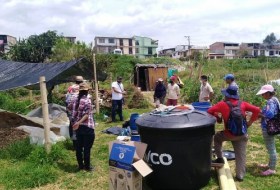News
Urban gardens: Towards a public policy for food sovereignty in Popayán
Different research groups, seedbeds and teachers from the University of Cauca lead the agro-ecology production project to promote urban gardens in the capital of Cauca.
Within the framework of the project "Agroecological production in Popayán: Lessons for a public policy of food sovereignty", financed within the framework of the internal call for Support for Seedbeds 'Cultivating Seeds 2018' of the Vice-rector for Research of the University of Cauca, continues the delivery of implements for urban gardens in the city of Popayán.
The Project of the Research Groups: Economic Thought, Society and Culture; Research for Rural Development TULL; GICEA and GIAPRIP, and their research seedbeds: TULL seedbed, Social Economy and Culture of Peace, Alternative Development Models and AGORA, is executed by the Center for Innovation and Social Appropriation of Coffee Growing and is led by teachers and researchers Olga Lucía Cadena Durán from the Faculty of Accounting, Economic and Administrative Sciences and Gustavo Alegría Fernández from the Faculty of Agrarian Sciences.
The proposal defined some guidelines to propose a public policy on food sovereignty in the municipality, within the framework of improving the conditions of sustainability of Payanese society, adopting dynamics typical of agro-ecology and promoting urban gardens located in the “Loma de la Virgen” neighborhoods. , “Los Naranjos” and “La Paz”, and opened the door for the start of four other spaces in different latitudes of the city, the “Ojito de agua” in “La Paz”, the Association of agro-ecological housing and community dining room in “Canales de la Florida”, the orchard of “Julumito” and the humanitarian garden.
Social appropriation strategies for food sovereignty and agro-ecology were implemented, strengthening the network of agro-ecological gardens, with different community groups and allied institutions, with which the research team has been providing advice and delivering different implements for each growing space .
Olga Lucía Cadena Durán, professor at the University of Cauca, principal researcher of Cicacultura and director of the project, highlighted the interdisciplinary contribution in research within the Alma Mater caucana for the formulation of the proposal, while research groups were integrated with their respective Seedbeds: “The internal work was carried out within the framework of the Social Economy and Peace Culture Seedbeds (Economy), Alternative Models to Development (Economy), TULL (Agricultural Engineering) and Ágora (Political Science), supported by a group and a seedbed of investigation of the University of Quindío called Cinedades ”.
The teacher Cadena Durán stressed the contribution of the Cicacultura Project and its incidence in 33 municipalities of Cauca for the achievement of this initiative in the city, collecting practices from the Agro-ecological Schools Farms and the exercises in Solidarity Economies, in which learning is invited through participatory community work and the exchange of knowledge. “Thanks to this effort we have students and professionals from various communes of the city who have been interested in the subject; they want to promote it, maintain it and replicate it in many communes and villages”, he adds.
From Cicacultura, as a Center that works to improve the quality of life of coffee-growing and producer families in the department of Cauca, it is essential to continue betting on the strengthening of different social and investigative processes, to continue carrying a message of peace and social innovation through of research with regional relevance.
The project achieved a volunteer program by the Vice President for Culture and Welfare called Volunteering in Agro-ecological Urban Gardens, which to date has linked more than 300 students from different undergraduate careers, being the program that has convened the largest number of students among all the volunteer services offered by the University of Cauca. In the generation of new knowledge, three research articles were presented for publication in indexed journals, exposing notions related to food sovereignty; a graduate thesis belonging to the Economics program, as well as a chair in food sovereignty to join undergraduate courses that address similar topics.
Regarding the objective for which the work carried out points out, the professor, researcher of Cicacultura and formulator of the project from the agrarian component, Gustavo Alegría Fernández, comments that, “The idea is to link the orchards with their loved ones (community), those gardens establish them in a network and support them with the Research Center and the University of Cauca so that the idea that food production in cities is viable is clarified”.
The researcher assures that it is important to pass the proposals of the paper to the context for their application, taking into account the times of pandemic that society is going through: "Today it is more pertinent than ever to be able to generate garden spaces, because they are places of appropriation and strengthening of food sovereignty with an agro-ecological approach”.
"The garden becomes a space for transformation, whoever works in the garden is more aware of food, environment and solidarity", concludes Gustavo Alegría Fernández.
“It seems to me that working in a garden is a training process that should be done with all the young people at the University (…) The moment you manage to cross training as a person with the technical and academic training that the university can give you surely you are going to create better beings for this society, "said Olga Lucía Cadena Durán.
Cicacultura is the first Center for Innovation and Social Appropriation in southwestern Colombia, attached to the Office of the Vice President for Research at the University of Cauca.
More Info:
Coffee growing
Email: cicaficultura@unicauca.edu.co
Gustavo Alegria Fernandez
Faculty of Agricultural Sciences


